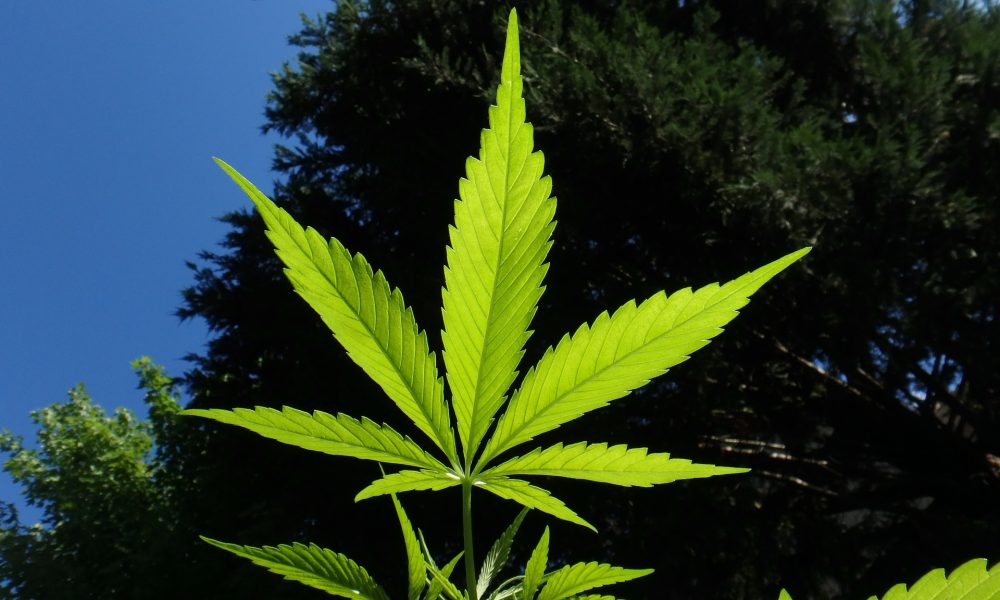More than 14 months after voters in Mississippi passed an initiative to legalize medical marijuana—a law the state Supreme Court later overturned—Republican-led lawmakers have sent a bill to the governor on Wednesday that would establish a more limited cannabis program for patients, the result of months of negotiations and last-minute changes to a nearly 450-page bill.
Following a conference committee meeting during which lawmakers from the House and Senate approved a change in how certain marijuana businesses would be zoned, both chambers passed the final legislation with veto-proof majorities. The Senate’s tally was 46-4, with one member voting present, and the House cleared the bill on a 103-13 vote.
While the overall bill remains largely the same as an earlier version passed by the Senate this month, amendments made last week in the House reduced the overall monthly amount of cannabis products available to patients and removed the Department of Agriculture and Commerce from oversight of the industry.
“This has been a long journey, and it’s nice to be in a place where everyone is in agreement,” Rep. Lee Yancey (R), who championed the bill in the House, said at Tuesday’s press conference. “It looks like we will finally be able to provide relief to those people with debilitating illnesses who so badly need it. Medical cannabis will now be an option for them as soon as we get the conference report signed and sent to the governor.”
The legislature will next formally transmit the bill to Gov. Tate Reeves (R), who then has five days, excluding Sundays, either to sign it into law or return it with objections. If the governor doesn’t take any action by the deadline, the bill will become law without his signature.
Speaking to local news station WLOX after Wednesday’s votes, Reeves applauded the tighter restrictions on cannabis added to the bill as it went through the process but said his office would still need to review the final text before deciding whether to sign it.
“I’m very pleased that we got to see so much progress made in improving the bill over the last six months,” he said. “Every change they made, they were moving in more in the direction of what we could get comfortable with. The bill is thick, and so we’re going to have lawyers read through it over the next few days and we’ll make a decision by early next week.”
Reeves has been wary of legalization in recent months, at one point threatening to veto a draft bill if it made it to his desk. Since then, proponents in the legislature have worked to balance the voter-approved initiative’s more permissive proposals against the governor’s calls for tighter restrictions.
The governor said last week that the measure has become “better” with every revision and rightly predicted there would be further amendments by the House.
Provided the bill becomes law, dispensaries would be licensed about six months later, meaning Mississippi’s medical cannabis program could be up and running, at least in limited form, by the end of the year.
—
Marijuana Moment is already tracking more than 1,000 cannabis, psychedelics and drug policy bills in state legislatures and Congress this year. Patreon supporters pledging at least $25/month get access to our interactive maps, charts and hearing calendar so they don’t miss any developments.![]()
Learn more about our marijuana bill tracker and become a supporter on Patreon to get access.
—
The bill, SB 2095, draws heavily from provisions negotiated by lawmakers in the second half of last year, as legislative leaders prepared a bill for an anticipated special session last summer that the governor never called. Supporters say the lengthy proposal represents a middle ground between the more permissive plan approved by voters and the narrower approach preferred by Reeves and some lawmakers.
The legislation as now approved by both chambers would allow patients with about two dozen qualifying medical conditions to purchase the equivalent of 3.5 grams of marijuana (or 1 gram of cannabis concentrate) per day, with a maximum monthly limit of 3 ounces. Voters approved a monthly limit of 5 ounces in 2020, and the bill as passed by the Senate last week would have allowed 3.5 ounces, but that was further scaled back by the House earlier this week.
Qualifying conditions under the bill include cancer, Parkinson’s, Huntington’s, muscular dystrophy, glaucoma, spastic quadriplegia, HIV, AIDS, hepatitis, Alzheimer’s, sickle-cell anemia, Crohn’s, ulcerative colitis, neuropathy, spinal cord disease or severe injury as well as chronic medical conditions or treatments that produce severe nausea, cachexia or wasting, seizures, severe or persistent muscle spasms or chronic pain.
Further conditions could be added later by regulators via petition. State-issued patient registration cards would cost $25, though some people could qualify for a lower price.
Registered patients would be subject to purchase limits that would restrict them to no more than one “medical cannabis equivalency unit” per day, which the bill defines as 3.5 grams of cannabis flower, one gram of concentrate or up to 100 milligrams of THC in infused products. While those limits are significantly lower than in most states where cannabis is legal for medical patients, Reeves said last year the program should allow only half those amounts.
Patients or caretakers would be forbidden from growing their own cannabis under the proposal. Products from state-licensed companies, meanwhile, would be limited to 30 percent THC for cannabis flower and 60 percent for concentrates.
Medical marijuana would be taxed at a wholesale rate of 5 percent, and purchases would also be subject to state sales tax.
While smoking and vaping cannabis is allowed for patients, both would be illegal in public and in motor vehicles. It would still be a crime for patients to drive under the influence.
The advocacy group Marijuana Policy Project, which has criticized some of the plan’s limitations compared to the voter-passed initiative, nonetheless called the bill an important step forward for the state.
“Today is an historic day for the patients of Mississippi,” Kevin Caldwell, the group’s Southeast legislative manager, told Marijuana Moment. “We congratulate the legislature for upholding the will of the people, and we call on Gov. Tate Reeves to sign this legislation into law when presented to him.”
The legislation would task the Mississippi Department of Health to oversee the new industry and establish a nine-member advisory committee to make recommendations on issues such as patient access and industry safety.
Previous versions of the bill also tasked the state Commission of Agriculture and Commerce with regulatory duties, but the House removed the agency through an amendment. Commissioner Andy Gipson, who for months had pushed back against the plan, thanked House Speaker Philip Gunn and other lawmakers for making the change in a statement issued last week.
“The best place for a truly medical program is under the Department of Health, which reflects the will of the voters in Initiative 65,” Gipson said, according to SuperTalk Mississippi. “This change is good policy for Mississippi agriculture and allows us to focus on our core mission. It is also good policy for the taxpayers of Mississippi because it achieves greater efficiency in the use of funds by reducing the number of agencies involved in the program.”
Licensing of cannabis businesses other than dispensaries—including cultivators, processors, transporters, disposal entities, testing labs and research facilities—would begin 120 days after the bill’s passage, with the first licenses issued about a month after that. The dispensary licensing process would kick off 150 days after passage, with the first licenses coming a month later.
In general, local governments could not ban medical cannabis businesses outright or “make their operation impracticable,” the bill says, but a separate provision would allow local governments to opt out of the program altogether within 90 days of the bill’s passage. In such cases, citizens could then petition to put the question to a vote.
There would be no limit on the number of licensed businesses under the plan. Cannabis businesses may have to get seek local approval to operate, however, and municipalities can adopt zoning and land use restrictions.
The original Senate bill would have allowed cultivators and processors to be located only in areas zoned for agricultural or industrial use, and the House later added an amendment to let those businesses set up in commercially-zoned area as well, but the Mississippi Municipal League pushed back on the change. The conference committee altered that by saying that the businesses could only operate commercial zones if granted a variance by a local government.
Mississippi voters decisively approved a broad legalization initiative in November 2020, but the state Supreme Court overturned the measure on procedural grounds last May—simultaneously doing away with the state’s entire initiative process.
For much of last year, it appeared lawmakers were set to pass a medical marijuana bill during a special legislative session, but the governor ultimately decided against calling the special session after reaching an impasse with lawmakers. Those who supported legalization said at the time that responsibility for the failure rested with Reeves.
Later that month, Reeves dodged questions from patient advocates about why he’d failed to call the special session. Then in late December, he said on social media that he had “repeatedly told the members of the Legislature that I am willing to sign a bill that is truly medical marijuana,” but stressed that there should be “reasonable restrictions.”
Last week, before the House floor vote, Rep. Lee Yancey (R), who chairs the House Drug Policy Committee and who’s been working on the legislation with Sen. Kevin Blackwell (R), said that he never imagined he’d be in the position to legalize cannabis. But he said he worked to ensure the bill was focused on providing medicine to patients, not paving a route to a recreational program as critics have claimed.
“When I got involved in this bill, I said, ‘How can we build a wall around this program so the people who get it are the people who need it the most, and only the people who need it the most?” Yancey said. “This is not for everybody out on the street. This is not for a bunch of kids. This is for hurting people with debilitating conditions.”
A poll released in June found that a majority of Mississippi voters support legalizing marijuana for both medical and recreational use, with 63 percent saying they want the legislature to pass a bill that mirrors the ballot measure that was nullified by the Supreme Court.
Amazon Endorses GOP-Led Bill To Federally Legalize Marijuana
Medical Disclaimer:
The information provided in these blog posts is intended for general informational and educational purposes only. It is not a substitute for professional medical advice, diagnosis, or treatment. Always seek the advice of your physician or other qualified healthcare provider with any questions you may have regarding a medical condition. The use of any information provided in these blog posts is solely at your own risk. The authors and the website do not recommend or endorse any specific products, treatments, or procedures mentioned. Reliance on any information in these blog posts is solely at your own discretion.







